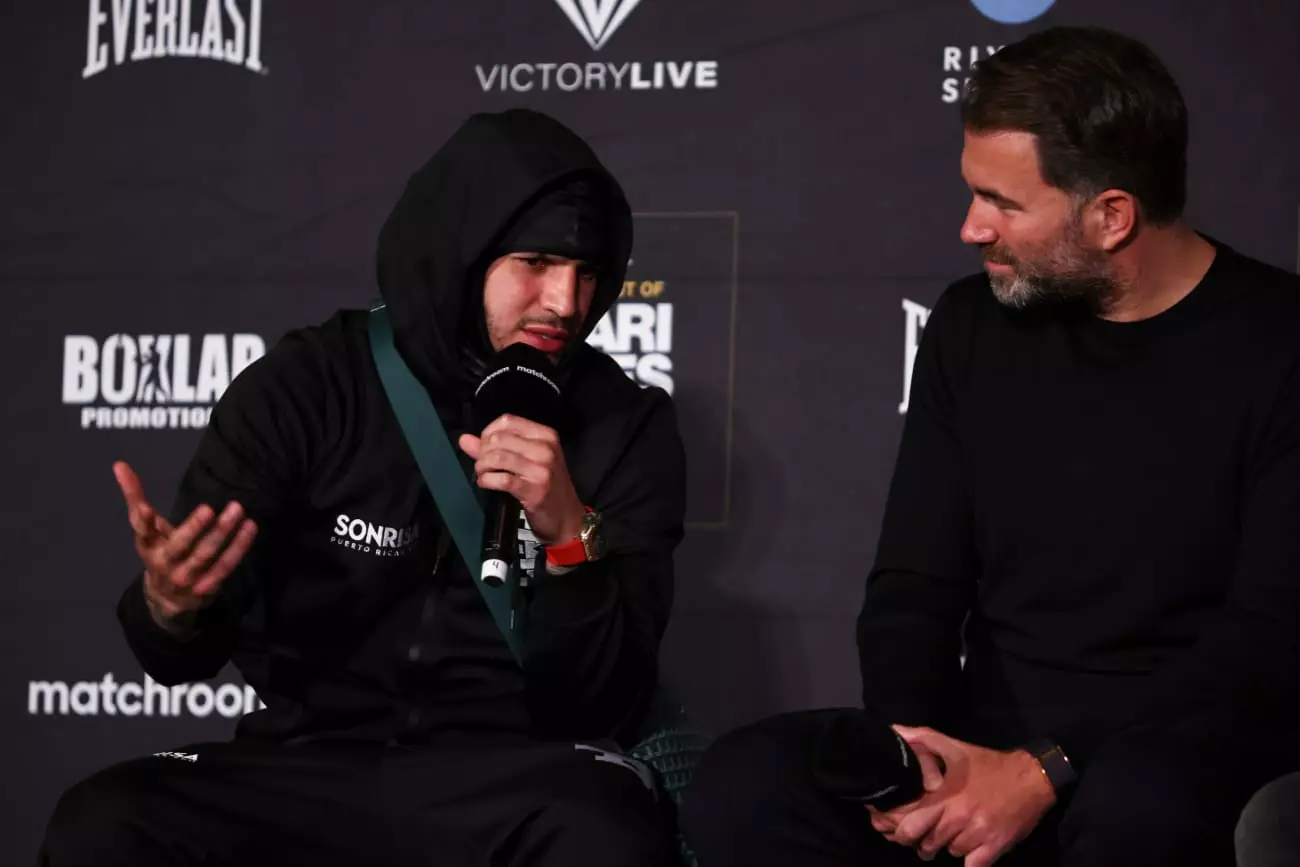Edgar Berlanga, a rising star in the boxing world, recently unleashed a torrent of criticism towards promoter Eddie Hearn, expressing profound dissatisfaction with their partnership. Berlanga, whose record stands at 22 wins, 1 loss, and an impressive 17 knockouts, feels that Hearn has not only mismanaged his career but has also undervalued his ambitions. The root of Berlanga’s grievance stems from a failed opportunity to secure a fight against IBF super middleweight champion William Scull, an event he believed would lead him on a direct path to a lucrative rematch with the legendary Canelo Alvarez. Such ambitions reveal the dual nature of Berlanga’s persona; while he embodies the spirit of a fighter, he is increasingly adopting the mindset of a businessman as he seeks to redefine his career trajectory.
Berlanga’s bold assertions indicate a self-awareness that is often rare in the sport. He believes that Hearn has treated him as a subordinate rather than a business partner, a sentiment that resonates with many fighters who feel shackled by their promotional contracts. In his remarks, Berlanga stated that if he were in a better negotiating position, he would have essentially orchestrated his own opportunities, securing fights that could enhance both his reputation and financial standing. He envisions a future where he can act as his own promoter rather than being dictated to by the likes of Hearn—a transformative concept that could redefine how fighters operate within the boxing industry.
A Critical Look at the Canelo Rematch Dream
Berlanga is eager for a rematch against Canelo, largely due to the $10 million payday he received in their previous encounter. However, one has to question the feasibility of this ambition. Critically examining Berlanga’s past performances, it becomes evident that he has yet to capture a world title and his most notable victory is against Padraig McCrory. This raises legitimate concerns about his readiness for such high-stakes matchups. Critics argue that it might be delusional for Berlanga to assume that Canelo, who famously favors rematches only with fighters who provide a challenge, would be keen to face him again without a significant change in circumstances.
Canelo’s history reveals a strategic approach to rematches, typically engaging only with opponents who present a competitive threat or a narrative worth pursuing. Berlanga’s assertion that capturing the IBF title would compel Canelo to fight him again is grounded more in wishful thinking than in an understanding of Canelo’s career strategy.
Upcoming Fight and Future Considerations
As Berlanga gears up for his upcoming match against Jonathan Gonzalez-Ortiz, he exudes an air of determination that suggests he is set on proving his critics wrong. He is adamant about showcasing his skills and contends that his performance against Gonzalez-Ortiz will be a harbinger of what lies ahead against other top contenders in the super middleweight division. Berlanga’s confidence is palpable as he discusses his plan to dismantle not only Gonzalez-Ortiz but also potential future opponents like Caleb Plant, Jaime Munguia, and Diego Pacheco.
Interestingly, Berlanga’s decision to leave Hearn and Matchroom after this bout may signify a pivotal upheaval in his career. He openly invites other promoters and networks to engage with him, indicating a desire for collaborative partnerships that could facilitate more favorable fight opportunities. This proactive stance is indicative of a fighter who recognizes the need for agency in an industry that often diminishes the voices of those within it.
The Fighter as a Business Entity
Berlanga’s rhetoric highlights a crucial shift in the boxing landscape where fighters are starting to realize their worth beyond just being athletes. His insistence that he does not want to be subservient to a promoter encapsulates a growing sentiment among professional boxers who are eager to assert control over their careers. The notion that a fighter should embrace an entrepreneurial mindset is gaining momentum, and Berlanga’s complaints about Hearn might serve as a rallying point for others in similar predicaments.
Berlanga’s plea for equitable treatment and respect from promoters touches on broader issues of agency in sports, particularly highlighting the fine balance between the business of boxing and the artistry of it. His narrative speaks not only to his personal frustrations but also to a collective movement among modern boxers seeking to navigate the complexities of their careers on their own terms.
Delusions of Grandeur or Strategic Vision?
While some may deem Berlanga’s aspirations as naive or extravagant, it is essential to analyze them in the context of an evolving boxing culture. His dissatisfaction with Hearn and desire for a significant rematch with Canelo highlights a critical junction in his career. Viewed through the lens of self-promotion and personal agency, Berlanga’s situation also serves as a poignant reminder of the challenges faced by fighters in a landscape dominated by powerful promotional entities.
Though he may appear overly ambitious to some, Berlanga’s willingness to vocalize his needs and grievances places him at the forefront of a necessary dialogue about fighter autonomy. Whether or not his dreams come to fruition remains uncertain, yet his actions signal a pivotal transformation in the relationship between athletes and promoters, rendering it vital to watch how this narrative unfolds in the boxing arena.


Leave a Reply